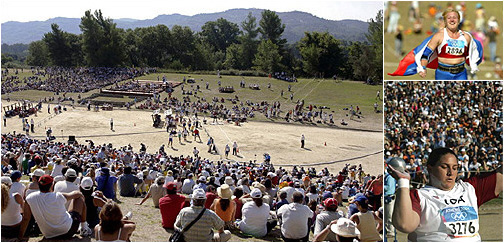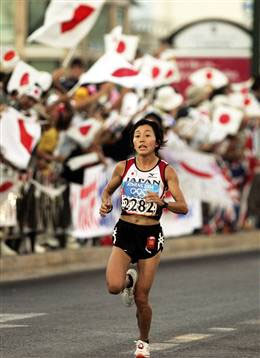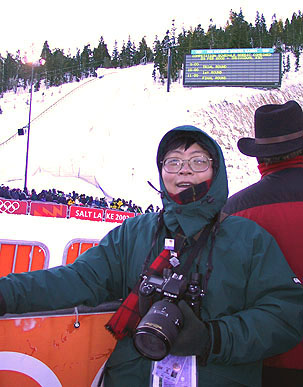
Remaking History
 |
Reuters, 18 August 2004: Kristin Heaston of the United States (top photo, below right) competed in shot put at the ancient Olympic stadium in Olympia, during the women's qualification round of the Athens 2004 Olympic Games. Heaston made history even before the shot put left her hand, becoming the first woman to compete at the site that gave birth to the Olympics 2,780 years ago. The gold went to Irina Korzhanenko of Russia (top photo, upper right), who would lose it later due to her positive test for the steroid stanozolol -- her second doping violation. (Clockwise from left: AFP photo by Jeff Haynes, Reuters photo by Kieran Doherty, and Reuters photo by Yannis Behrakis) Inspired by the stone-throwing contests of antiquity, the shot put was concocted in 1896 for the first modern Olympics in Athens. Another sport created for the occasion was the marathon. Legends said that, in 490 BC, Pheidippides ran from the Battle of Marathon to Athens to announce the triumph of the Greeks over the Persian invaders. "Rejoice, we conquer!" shouted the herald, who then dropped dead. 2,494 years later, Athens organizers retraced the 40km race that first took place in 1896, won by Spiridon Louis of Greece -- all the way from the town of Marathon to the white-marbled Panathinaiko Stadium, built over an ancient stadium for the 1896 games. On 22 August 2004, the first woman to follow the steps of Pheidippides and Louis to victory was Mizuki Noguchi (left photo) of Japan, who ran the hilly 42 kilometers in 2 hours, 26 minutes and 20 seconds. (AP photo by Koji Sasahara) |
The Olympics: Please place no ads here
Whenever McDonald's is selling toys or other doodads made in the likenesses of characters seen in a current movie, it always uses a variant of the phrase "in celebration of X..." in its constantly-running commercials, where X is the title of the movie being aggressively merchandized.
More than one can play that game. Therefore, in celebration of the 2004 Summer Olympics in Athens, I am reprinting an essay written in celebration of the winter games just two years earlier at Salt Lake City.
* * * * *
The Olympics are like Christmases eternal: They are commercialized to death, but we still love them.
|
|
Go to www.olympics.com.
Although you were able to collect the stats, the photos and the background
stories of the Salt Lake winter games, you had to do so by weaving through a
maddening slalom of adverts and corporate logos. While retrieving an
outline of events at the Utah Olympic Park, an errant mouse movement took
me to the corporate site for Xerox. I pitied the athletes who were obliged to become constant pitchmen. One American skier, whose name I tactfully forgot, dutifully mentioned his sponsor during a 30-second TV interview: "I'd like to thank Home Depot for hiring me…" |
Every time the Olympics come stateside – recent memories include Lake Placid, Los Angeles and Atlanta – I am always embarrassed by my country's blatant tendency to reveal our two most enduring traits: (1) the mentality best summarized as "we - Americans - are - number - one - and - how - do - you - pronounce - your - name," and (2) the crass commercialism that truly makes our nation great.
This time, we
deserved some leeway as far as over-the-top patriotism was concerned, while the
tragedy of 11th September 2001 was less than six months in the past. However, in retrospect of the extravagant bribes paid
to greedy International Olympic Committee (IOC) officials to bring the winter games to Utah in the first place,
I'd expect a little more modesty over material excess on this land of Mormon
reserve. Such naïveté on my part was unforgivable in this day and age.
The surprising – and perhaps redeeming – qualifier here was that, for the
people who were actually in Utah to make things happen, it really didn't matter.
From the detached comfort of our living rooms, the disjointed TV programming amid
the all-too-many commercial breaks could be quite jarring, despite
its best possible view of the action. On the actual grounds, though, where
athletes proved their lifetime's worth of training in brief moments of
brilliance, volunteers welcomed the world before dawn in sub-freezing
temperatures, and spectators waved flags, rang cowbells and yelled ecstatically at
everyone coming down the mountain, the last thing on anyone's mind was how much
money it took for the whole world to be this happy, and to have this much fun.
CW, February 2002, updated 18 August 2004
Postcards from Athens: A Day Remembered
| Back to top |

